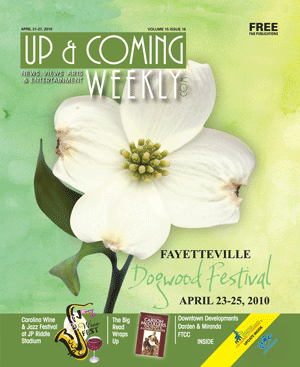 Earlier this year the rest of the state found out what Cumberland County residents already know: the Dogwood Festival is one of the very best events around. In February, the Dogwood Festival was named the Event of the Year by the North Carolina Association of Festivals & Events. The festival’s director, Carrie King, also earned top billing as she was named the Director of the Year.
Earlier this year the rest of the state found out what Cumberland County residents already know: the Dogwood Festival is one of the very best events around. In February, the Dogwood Festival was named the Event of the Year by the North Carolina Association of Festivals & Events. The festival’s director, Carrie King, also earned top billing as she was named the Director of the Year.
“This is a huge honor for our organization,” said King, the festival’s executive director. “It feels good to be recognized by your peers in the industry, community and state. Fayetteville has a lot of great events, and we are pleased to share this honor with our community. We are truly a community produced event — and without everyone’s continued support — we could not produce this award winning event.”
The kudos don’t stop there.
In addition to winning these state awards, the Fayetteville Dogwood Festival has also been named a Top 20 Event in the Southeast for April 2010. The best events across the Southeast compete to receive the prestigious “Top 20 Events” designation. Through a nomination process, Southeast Tourism Society chooses the Top 20 events in the Southeast for each month of the year and publishes this list of winners quarterly. The Top 20 Events publication is sent to over 1,600 newspapers, magazines, radio stations, TV stations, AAA publications and others. Nominations were received from twelve different states, and the Fayetteville Dogwood Festival, nominated by the Fayetteville Area Convention and Visitors Bureau, was chosen as one of two winners for the State of North Carolina.
Bill McMillan, Board President says, “The Fayetteville Dogwood Festival strives to produce quality festivals for Fayetteville and its surrounding counties. Without the day-to-day leadership that Carrie King provides to the staff and Board of Directors, these awards, and ultimately our success, would not be possible. These awards are the result of hard work and dedication by the staff, Board of Directors, and our volunteers. The entire festival organization is excited for the opportunity to again put our best foot forward during the fourth weekend in April 2010.”
So you don’t have to worry about checking your calendar to fi nd out when that fourth weekend is, let us assure you, Fayetteville’s annual celebration of spring is this weekend — April 23-25.
Founded in 1982 by former Fayetteville Mayor Bill Hurley, businessman John Malzone and several other city leaders, the festival has continued to grow over the years, and King is proud to announce that it has grown again this year.
“We are going to go all the way down Hay Street to the Market House — last year we stopped in the 200 block of Hay Street — so our footprint is a little bigger,” said King. “It’s not by much, but it gave us the ability to add more vendors.”
Last year the festival returned to its roots, moving out of the confi nes of Festival Park, although a large portion of the event is still held in the park.
“Last year we took the street festival back out to the street, with vendors setting up on Ray Avenue and Hay Street,” she explained. “The community responded very well to having vendors back on Hay Street. The move gave it more of the original feel of the Dogwood Festival. With the addition of the shade on Hay Street, we received a lot of qualifi ed vendors.”
King noted that over the years, it has been a goal of festival organizers to improve the quality of vendors.
“We’re trying to get away from the commercial vendors and focus on higher end arts and crafts,” said King. “And we definitely got them this year. We received a lot of applications from very qualifed vendors. They are selling things you defi nitely can’t go to the mall or Walmart to purchase.”
While you can stroll the streets to shop from the vendors, you can stay within the footprint to take in the music, exciting displays and the midway, all of which kicks-off on Friday night at the Bloom and Boom party.
The Bloom and Boom event coincides with Fayetteville’s 4th Friday, but organizers believe having the events run together will bring
more visitors to both venues. In addition to those two events, the Boys and Girls Clubs of Cumberland County is hosting its fi rst annual Garden Party in Cross Creek Park starting at noon on Friday, so go ahead, bite the bullet take the day off, or at least half the day so you can jump in feet fi rst to these incredible activities.
Before you head down to Festival Park for the party, you may want to stop off at the Harris Teeter parking lot to buy a plate, or two or three, of some of the best BBQ in the city at the Crime Stoppers annual BBQ plate sale. Plates are just $6, and all the money goes back into the community. If you decide to do that, make sure you eat the BBQ before you get to the festival because no outside food or coolers are allowed in Festival Park.
Once you get downtown, take some time to check out all of the fabulous art venues offered throughout the historic city center. In particular you’ll want to hit the Arts Council of Fayetteville/Cumberland County and check out the annual exhibit of Public Works.
Then head on over to the midway to ride some of your favorite carnival rides, and as night falls, make sure you are in Festival Park to hear the country sounds of Joe Nichols. That’s one concert you’re not going to want to miss.
The same can be said of the concert that follows on Saturday: Soul Asylum and the Gin Blossoms.
After the last notes are heard on Friday night, make sure to keep your eyes on the skies, as the Boom part of the party gets underway with a fi reworks display. King said that this particular event is one of her favorites.
“It’s one of the few times I actually sit back and take a moment to take it all in,” she said.
and take a moment to take it all in,” she said.
On Saturday morning, if you’re an early bird you can enjoy the spectacle of hundreds of motorcycles and convertibles roaring down the city streets as the Hogs and Rags Spring Rally gets underway at the Airborne and Special Operations Museum.
At noon, you can start shopping. Vendors signed up to participate include pottery, paintings, jewelry, sculptures and much more. Once you’ve shopped ‘till you’ve dropped, be sure to follow your nose to the highlight of most festivals — the food court! You can expect to find some of your favorite foods on hand: gyros, funnel cakes, ice cream, ribbon fries and pineapple chicken willall be on the menu, as well as many of your other favorites.
In addition to all the arts and crafts that adults love, the Partnership’s Kidstuff, presented by the Partnership for Children of Cumberland County, will feature Pirates In the Sky, and the Toddler Zone, which is an infl atable maze of castles and tunnels that the toddlers will love, face painting and interactive games.
Sponsor booths will be located on the Festival Park promenade and will feature fun giveaways and much more. With all of that in mind, you may want to take a deep breath and just plunge into the spirit of the event, and the best place to do that is at Festival Park. The Dogwood Festival will kickoff with the Bloom & Boom Kickoff Party on Friday, April 23, at 6 p.m. On Saturday, April 25, the street festival starts at noon and runs through 10 p.m., and on Sunday it begins at 1 p.m. and runs through 6 p.m.
Anyone who has ever attended an event at the park knows that parking is at a premium, but don’t worry, a park and ride shuttle service will be available. Free parking is available in city lots on Person Street and Hay Street, as well as other various downtown locations.
Free off-site shuttle service will be available at the Fayetteville Parks and Recreation Center on Lamon Street. The shuttle service will run approximately every 15 minutes to transport passengers to the festival area.
Disabled parking will be designated in the Bank of America parking lot at the corner of Ray Avenue and Mason Street and the Hay Street United Methodist Church parking lot. Availability is on a first come, fi rst served basis. Organizers remind people that animals and coolers are not allowed. Service animals are permitted.
 How to resolve AdBlock issue?
How to resolve AdBlock issue?  How to resolve AdBlock issue?
How to resolve AdBlock issue? 


 How to resolve AdBlock issue?
How to resolve AdBlock issue?  How to resolve AdBlock issue?
How to resolve AdBlock issue?  How to resolve AdBlock issue?
How to resolve AdBlock issue?  How to resolve AdBlock issue?
How to resolve AdBlock issue?  How to resolve AdBlock issue?
How to resolve AdBlock issue? 





